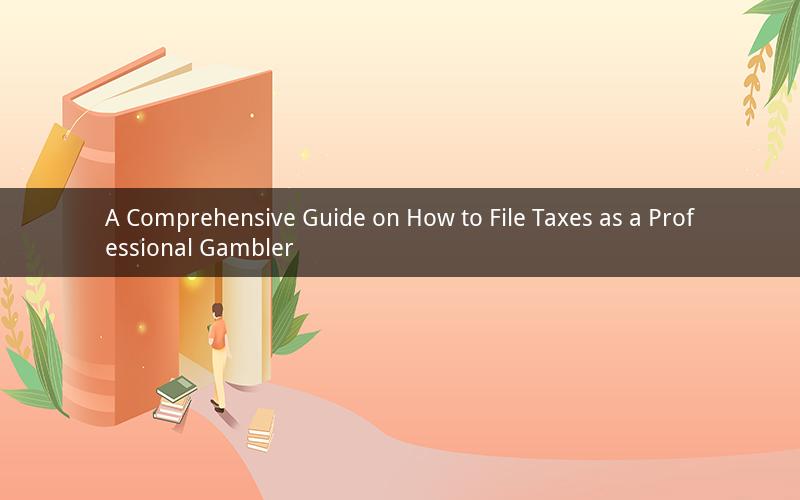
Introduction:
Gambling can be an exciting and potentially lucrative profession. However, for professional gamblers, it's essential to understand how to file taxes correctly to avoid any legal issues. In this guide, we'll explore the ins and outs of filing taxes as a professional gambler, including important forms, deductions, and best practices.
Understanding Professional Gambling Income:
To file taxes as a professional gambler, it's crucial to determine whether your gambling activities are considered a business. The IRS considers professional gamblers as self-employed individuals who must report all gambling income on Schedule C.
1. What qualifies as professional gambling income?
Professional gambling income is the income derived from gambling activities that are conducted regularly and with the intent to make a profit. To qualify as a professional gambler, you must meet the following criteria:
a. You have gambling income that exceeds your expenses.
b. You maintain a separate set of books and records for your gambling activities.
c. You have a demonstrated intent to make a profit.
2. How do I determine if I'm a professional gambler?
To determine if you're a professional gambler, consider the following factors:
a. The amount of time you spend gambling.
b. The frequency of your gambling activities.
c. The level of expertise you possess in gambling.
d. The amount of money you spend on gambling-related expenses.
Reporting Gambling Income:
Once you've determined that you're a professional gambler, it's time to report your gambling income. Here's how to do it:
1. Report all gambling income on Schedule C (Form 1040).
2. Keep detailed records of all gambling income and expenses.
3. Include any prizes, winnings, and other forms of compensation received from gambling activities.
4. Deduct any allowable expenses related to your gambling business.
Common Tax Deductions for Professional Gamblers:
As a professional gambler, you may be eligible for various tax deductions to reduce your taxable income. Here are some common deductions:
1. Travel expenses: Deduct expenses related to traveling to and from gambling venues, including transportation, lodging, and meals.
2. Entertainment expenses: Deduct expenses incurred for entertaining clients or potential clients, such as dining out or attending events.
3. Betting software and subscriptions: Deduct the cost of any software or subscriptions that help you analyze betting markets and make informed decisions.
4. Legal and professional fees: Deduct fees paid to tax professionals, legal advisors, or other experts related to your gambling business.
5. Gambling-related equipment: Deduct the cost of any equipment or tools used in your gambling activities, such as a computer or smartphone.
Important Forms and Documentation:
To file taxes as a professional gambler, you'll need to complete and submit several forms and keep detailed records. Here's a list of some essential forms and documentation:
1. Form 1040: U.S. Individual Income Tax Return
2. Schedule C (Form 1040): Profit or Loss from Business (Sole Proprietorship)
3. Schedule C-EZ (Form 1040): Net Profit or Loss from Business
4. Form 2106: Employee Business Expenses
5. Form 8829: Expenses for Business Use of Home
Best Practices for Filing Taxes as a Professional Gambler:
1. Keep detailed records: Keep track of all your gambling income and expenses in a separate set of books and records.
2. Consult with a tax professional: Consider hiring a tax professional with experience in gambling-related income to ensure compliance with IRS regulations.
3. Stay organized: Organize your records and keep them in a secure location to avoid any issues during tax season.
4. File on time: Ensure you file your taxes on time to avoid any penalties or interest charges.
5. Be prepared for audits: Keep in mind that the IRS may scrutinize your gambling income, so be prepared to provide supporting documentation if needed.
Conclusion:
Filing taxes as a professional gambler can be complex, but by understanding the rules and following best practices, you can ensure compliance with IRS regulations. Remember to keep detailed records, consult with a tax professional, and stay organized to make the process as smooth as possible.
Questions and Answers:
1. Q: Can I deduct my personal gambling losses on my taxes?
A: Yes, you can deduct your personal gambling losses on your taxes, but only up to the amount of your gambling income.
2. Q: Do I need to report my gambling income if I didn't win any money?
A: Yes, you must report all gambling income, whether you won or lost money. Failure to report gambling income can result in penalties and interest charges.
3. Q: Can I deduct my gambling-related expenses if I only occasionally gamble?
A: No, to deduct gambling-related expenses, you must meet the criteria of a professional gambler, which includes conducting gambling activities regularly and with the intent to make a profit.
4. Q: What should I do if I receive a notice from the IRS regarding my gambling income?
A: If you receive a notice from the IRS regarding your gambling income, contact a tax professional to assist you in addressing the issue and providing any necessary documentation.
5. Q: Can I deduct the cost of a sportsbook subscription on my taxes?
A: Yes, if you're a professional gambler, you can deduct the cost of a sportsbook subscription as an allowable expense related to your gambling business.